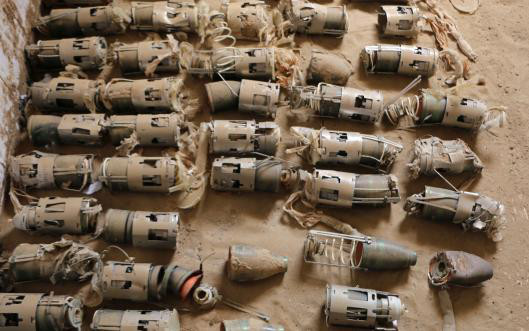On 20 December, the United Kingdom’s (UK) Defense Secretary Michael Fallon admitted that Saudi Arabian forces had used British-made cluster bombs in Yemen. Fallon’s admission before the House of Commons came after a government analysis concluded that the Saudi-led coalition had definitively used UK-manufactured cluster munitions in its ongoing intervention in Yemen. It also comes more than six months after Amnesty International documented Saudi Arabia’s use of UK-manufactured cluster munitions in May 2016, casting light on what the UK government knew but did not say.
The United Kingdom has played a unique role in diplomatically and militarily enabling Saudi Arabia’s human rights abuses. In 2013, Britain supported Saudi Arabia’s membership on the United Nations (UN) Human Rights Council, despite criticisms that Saudi Arabia’s presence on the Council would compromise the Council’s human rights work. In 2016, Saudi Arabia used its position on the Council to water-down a Netherlands-sponsored resolution drafted to establish an independent UN mission to investigate alleged human rights abuses in the conflict, including by the Saudi-led coalition. Ultimately, a weakened compromise resolution passed that ensured that Saudi Arabia’s Yemen investigatory body would remain in charge of investigating its own abuses.
The UK has also provided material support to Saudi Arabia to supplement its diplomatic endorsements. It has licensed £3.3 billion of arms to the kingdom since Saudi forces began their military intervention in Yemen in March 2015. This includes £1.1 billion for bombs and missiles and £2.2 billion for aircraft, helicopters, and drones. Beyond selling Saudi Arabia billions of pounds in weapons, Britain has trained Saudi Air Force pilots to use the bombs and missiles it has sold the kingdom. Saudi Arabia has used these weapons and pilots to attack hospitals, markets, weddings, and schools.
While the UK has sold £3.3 billion of arms to Saudi Arabia since March 2015, it is the content of a series of weapons sales prior to 1989 that this drawing attention. A number of these sales included a model of cluster munitions—BL-755s—that are designed to be dropped from the UK-made Tornado jet, which Britain has also sold to the kingdom. BL-755 bombs contain 147 smaller explosive “bomblets” that are designed to scatter and impact on contact, burning through tank armor, and exploding into more than 2,000 fragments. However, the “bomblets” frequently fail to detonate on impact. These unexploded ordinances litter fields, farms, and villages, and pose a long-term threat to civilians returning to their homes after the conflict. Amnesty International has documented 16 civilian deaths in Yemen, including of nine children, between July 2015 and April 2016 at the hands of UK-manufactured cluster bombs.
While the United Kingdom signed on to the Convention on Cluster Munitions in 2008, Saudi Arabia is not a party to the Convention, and therefore is not bound by international law to refrain from their use. Despite this, cluster munitions campaigners believe that the UK has a strong moral responsibility to ensure that any cluster bombs sold in the past are traced and that measures are taken to destroy existing stockpiles. However, the British government has not acknowledged this responsibility. Rather, until Fallon’s admission, the UK government had declared that “no UK-supplied cluster weapons have been used.” Amnesty rejected that claim as “shameful” in light of the evidence it had presented to the government in May 2016.
Now, parliamentarians are faced with the prospect that the UK government knew more than they were telling Parliament or that Saudi Arabia gave the government false assurances. There will be a vote in Parliament on 13 January 2017 on whether the UK should suspend arms sales to Saudi Arabia. MPs should move to suspend UK arms sales to Saudi Arabia and also call on the government to demand a UN-sponsored, independent inquiry into the human rights abuses in the conflict in Yemen.
Tyler Pry is the Sheikh Nimr al-Nimr Advocacy Fellow at ADHRB





